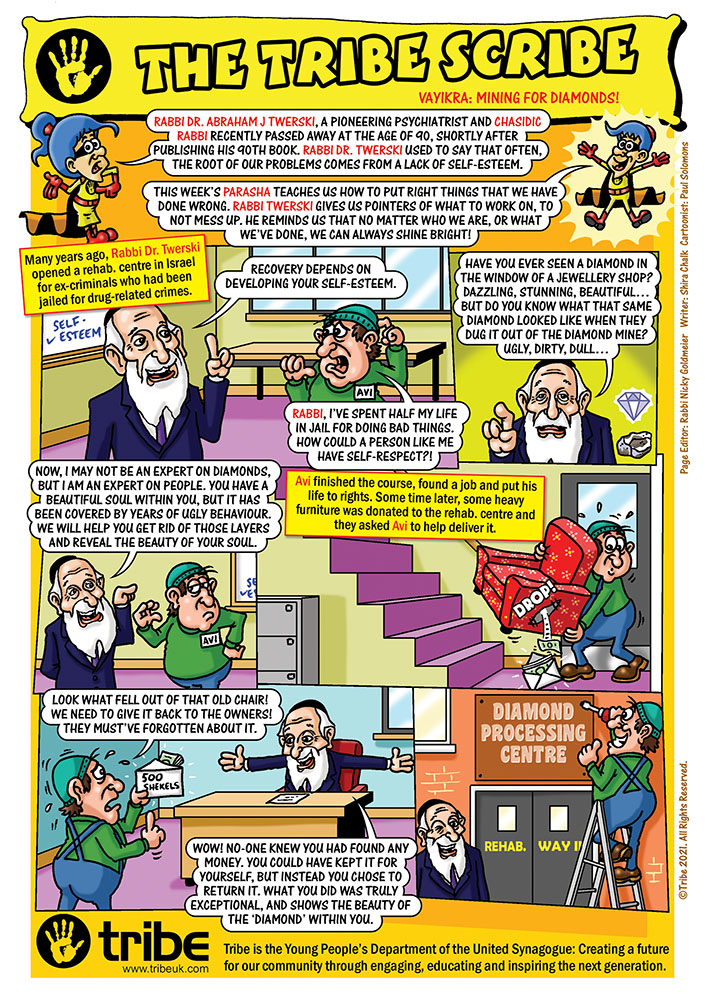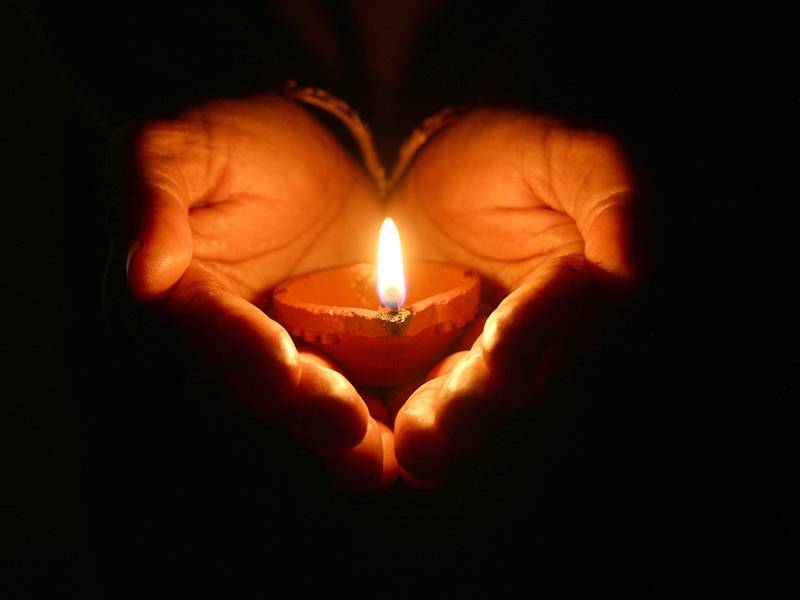Bonjour / Hello [nickname_else_first_name],
Table of contents
1) Perashat Hashavoua - Rabbi Eli Mansour
2) Halakhat Hashavoua (Halakhot related to day to day life) By Hazzan David Azerad -
When Erev Pesach Falls on Shabbat
3) Holy Jokes!
4) For KIDS

This Week's Parasha Insight with Rabbi Eli Mansour
Parashat Vayikra: The Joy of Misvot
The Torah in Parashat Vayikra discusses the various kinds of sacrifices, including the sin-offering that one was required to bring after committing certain sins. In introducing this sin-offering, the Torah speaks of "Nefesh Ahat" – literally, "one soul" – who accidentally sins. The Torah then adds, "Ba’asotah Ahat Mi’kol Misvot Hashem Asher Lo Te’asena Ve’ashem" – literally, "by doing one of all the commands of G-d which must not be done, and he bears guilt" (4:27).
While the overall intent of this verse is clear – referring to a person who committed an act which G-d commands us not to commit – the formulation is unusual. Why does it refer to the individual with term "Nefesh"? And why is the sinful act described as "one of the commands of G-d which must not be done"? Once the Torah describes a person who accidentally committed a sin, why do we need this elaboration, that he committed an act which he is commanded not to do? Furthermore, why does the Torah say about such a person, "Ve’ashem" – "he bears guilt"? If the sin was committed by accident, why is the person described as "bearing guilt"?
The Mishna in Pirkeh Abot (4:2) famously teaches, "Misva Goreret Misva" – one Misva leads to another. Once a person performs a Misva, he is led to do another. Many commentators raised the question of why we do not always see people who perform a Misva being naturally led to perform others. It is not uncommon to see people who perform Misvot sporadically and inconsistently. How could this be? If one Misva naturally leads to another, then are we not all constantly doing Misvot all the time?
The answer that many have suggested is that the Mishna refers only to Misvot which we perform with genuine joy and enthusiasm. If a person performs a Misva without any feeling, simply going through the motions because he feels he has to, without any fervor or excitement over the privilege of serving G-d, then the Misva will not have the effect of drawing him to additional Misvot. This is why we are not always drawn to additional Misvot after performing one Misva. If we perform a Misva by rote, or only out of a sense of obligation, without any joy or excitement, then it will not lead us to additional Misvot.
With this in mind, we can return to the difficult verse from Parashat Vayikra which we cited earlier. The Torah here alludes to a "Nefesh," a soul that is deficient, lacking the joy and fervor that ought to characterize Misva observance. In such a case, the individual will likely perform "Ahat Mi’kol Misvot Hashem" – only one Misva, because, "Asher Lo Te’asena" – his Misva will not lead to additional Misva performance,. And then, "Ve’ashem" – he will end up being guilty of sins, because the neglect of Misvot wrought by his lack of joy will ultimately result in his violating Torah laws.
As we enter the season of Pesach, we must strive to increase our joy in the performance of Misvot. This is a very special time of year when we have so many Misvot to perform. The more joyful we are in our observance, genuinely enthusiastic about the great privilege we have to serve our Creator, the more the Misvot of Pesach will lead us to perform additional Misvot, and thus catapult us to greater heights of Abodat Hashem (service of G-d) and closeness to the Almighty.

Halachot this week are selected and Translated by Hazzan David Azerad
When Erev Pesach Falls on Shabbat
Bi’ur Hametz and Shabbat Meals, Peninei - Halacha
When the 14th of Nisan coincides with Shabbat, bedikat ḥametz is performed with a berakha on the night of the 13th of Nissan THIS YEAR Thursday night, APRIL 10, because it is impossible to seek and eliminate ḥametz on Shabbat April 12 this year. After the search, we recite the Kal Chamira to nullify the cḥametz like in any other year. The following day, this year Friday, April 11, the Chametz is burned. This year, exceptionally, we do not recite the Kal Chamira after the burning of the Chametz. We will recite it on Shabbat morning, April 12, before 11:35 .The reason it is done this way is so that no one gets mixed up on other years when it's not Shabbat (SA 444:1-2). Ḥametz that will be eaten during the first two Shabbat meals is carefully set aside for Friday night and for Early Shabbat morning.
If it were permissible to eat matza on Erev Pesaḥ, we would presumably use matza at our Shabbat meals to avoid the problem of ḥametz. However, since it is forbidden to eat matza on Erev Pesaḥ so that it is appetizing to us at the Seder , we must save ḥametz for the first two Shabbat meals. To avoid problems with ḥametz foods, many people cook kosher-for-Pesaḥ foods for that Shabbat. They make kiddush and eat bread with spreads or salads in a room where people will not eat during Pesaḥ. After eating bread, they clean their hands, brush off their clothes, and then eat the rest of the meal in the kosher-for-Pesaḥ dining room.
The first Shabbat meal is eaten on Friday night, and the second on Shabbat morning. It must be completed by 10:16 AM this year (April 12), at which time ḥametz becomes forbidden (as printed in many calendars). Shabbat morning prayers must begin and end early so that the meal can be completed in time.
After the second meal, all remaining ḥametz must be gathered from the plates and tablecloth. Since it may not be burned on Shabbat, it is a good idea to flush it down the toilet and thus destroy it. This Bitul -Nullification of the Kal Chamira must be recited this year by 11:35 AM. After the meal, one should brush his teeth well. People generally plan their Shabbat meals wisely, so that it will be easy to gather up the leftover ḥametz and dispose of it
Se’uda shlishit, the third Shabbat meal, presents a problem: It is forbidden to eat ḥametz after the fourth hour of the day, and matza is forbidden the entire day. As a result, the obligation to eat a third meal is met by eating meat and fish or various fruits (SA 444:1). One may also eat matza balls, and according to many authorities, one may eat whole matzot that have been thoroughly cooked. One must avoid eating excessively during the third meal so that the matza of Seder night remains appetizing. There are other suggestions for those who wish to destroy all of their ḥametz before Shabbat, as explained below
Egg matza or matza ashira is made out of flour that was kneaded with fruit juice, which does not become ḥametz. The Sephardic custom is to permit eating it on Pesaḥ, while the Ashkenazic custom is to forbid. According to all customs, matza ashira may be used for the first two Shabbat meals, before the end of the fourth hour, although to fulfill the requirements of the Shabbat meal, one must be kovei’a se’uda (“establish a meal”). That is, one must eat the volume of four eggs (ke-beitzim) of egg matza and, with the rest of the meal, become fully satisfied. This will change the berakhot on egg matza from “mezonot” and “Al Ha-miḥya” to “ha-motzi” and “Birkat Ha-mazon”. If matza ashirawas baked with a reliable process, Sephardim may use it for se’uda shlishit, but it should be eaten by the end of the ninth seasonal hour of the day, about three hours before sunset. According to Ashkenazic custom, matza ashira may not be eaten after the fourth hour of the day (SHT and Igrot Moshe, in contrast to AHS, which permits eating it on Erev Pesaḥ, until the beginning of the holiday).
Cooked matza: Another option is to cook a whole matza. According to most opinions, one may eat cooked matza on Erev Pesaḥ, since it has been fundamentally altered and one would not fulfill the mitzva of eating matza on Seder night with such matza. Because it constitutes at least a kezayit, its berakhot are still “ha-motzi” and “Birkat Ha-mazon” and consequently one may use it to fulfill the obligation to eat three Shabbat meals. This is the ruling of MB 471:20 and SHT 19 ad loc.., AHS 444:5, and Yeḥaveh Da’at 1:91 n. 10. SHT 471:20 mentions in the name of SAH and Ḥayei Adam that frying is the same as cooking, and that Pri Megadimequivocates. On the other hand, MA 444:2 says in Maharil’s name that he never saw anyone adopt the practice of eating cooked matza at se’uda shlishit, and Gra implies that it may not be eaten on Erev Pesaḥ. Those who wish to follow the majority ruling and fulfill their obligation with cooked matza may do so (see SHT 444:1). MB 444:8 raises the idea of splitting the second meal into two, but this is not ideal, as se’uda shlishit should be eaten after midday.
Bevirkat Shabbat Shalom Umevorach
David Azerad
3) HOLY JoKeS!!
Selection of funny snippets, loosely related to this weeks parashah or current events, to brighten your day


reminder KNOT

4) FOR KIDS
Click on the image to open the youtube video














